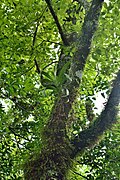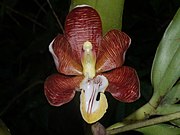Arachnis (plant)
| Arachnis | |
|---|---|

| |
| Inflorescence detail of Arachnis longisepala | |

| |
| Flowering Arachnis labrosa specimen | |
| Scientific classification | |
| Kingdom: | Plantae |
| Clade: | Tracheophytes |
| Clade: | Angiosperms |
| Clade: | Monocots |
| Order: | Asparagales |
| Family: | Orchidaceae |
| Subfamily: | Epidendroideae |
| Tribe: | Vandeae |
| Subtribe: | Aeridinae |
| Genus: | Arachnis Blume |
| Type species | |
| Arachnis flos-aeris (L.) Rchb.f.
| |
| Synonyms[1] | |
The genus Arachnis, abbreviated as Arach in horticultural trade, (common name scorpion orchid,[2][3]) is a member of the orchid family (Orchidaceae), consisting of more than 20 species native to China, India, Southeast Asia, Indonesia, the Philippines, New Guinea, and the Solomon Islands.[4][5]
Description[edit]
Vegetative characteristics[edit]
The appearance of the monopodial, epiphytic herbs of the genus Arachnis is characterized by distichously arranged, linear leaves.[6] The vining plants may grow into a dense thicket.[7] Arachnis does not produce pseudobulbs.[8]
Generative characteristics[edit]
The flowers are thought to resemble spiders,[8] and they are fragrant.[6][8] The fragrance has been described as musky.[8]
Etymology[edit]
The generic epithet Arachnis is derived from the Greek word arachne for spider.[9]
Ecology[edit]
Habitat[edit]
Arachnis senapatiana has been found growing in subtropical broad-leaved forests at elevations of 1747 m above sea level.[6]
Flowering[edit]
Arachnis senapatiana is known to flower in June.[6]
Taxonomy[edit]
Accepted species[edit]
There are currently 16 accepted species, including one natural hybrid:[1]
- Arachnis annamensis (Rolfe) J.J.Sm.
- Arachnis bella (Rchb.f.) J.J.Sm.
- Arachnis bouffordii Ormerod
- Arachnis calcarata Holttum
- Arachnis cathcartii (Lindl.) J.J.Sm.
- Arachnis clarkei (Rchb.f.) J.J.Sm.
- Arachnis flos-aeris (L.) Rchb.f.
- Arachnis grandisepala J.J.Wood
- Arachnis hookeriana (Rchb.f.) Rchb.f.
- Arachnis labrosa (Lindl. & Paxton) Rchb.f.
- Arachnis limax Seidenf.
- Arachnis longisepala (J.J.Wood) Shim & A.Lamb
- Arachnis × maingayi (Hook.f.) Schltr.
- Arachnis senapatiana (Phukan & A.A.Mao) Kocyan & Schuit.
- Arachnis seramensis (Ormerod) R.Rice
- Arachnis siamensis (Schltr.) Tang & F.T.Wang
- Arachnis sulingi'' (Blume) Rchb.f.
Species formerly placed in Arachnis[edit]
- Arachnis beccarii Rchb.f. is now considered to be Dimorphorchis beccarii (Rchb.f.) Kocyan & Schuit.[10]
- Arachnis breviscapa (J.J.Sm.) J.J.Sm. is now considered to be Dimorphorchis breviscapa (J.J.Sm.) Kocyan & Schuit.[11]
- Arachnis celebica (Schltr.) J.J.Sm. is now considered to be Dimorphorchis celebica (Schltr.) Ormerod[12]
- Arachnis imthurnii (Rolfe) L.O.Williams is now considered to be Dimorphorchis beccarii var. imthurnii (Rolfe) Kocyan & Schuit.[13]
- Arachnis longicaulis (Schltr.) L.O.Williams is now considered to be Dimorphorchis breviscapa (J.J.Sm.) Kocyan & Schuit.[11]
- Arachnis lowii (Lindl.) Rchb.f. is now considered to be Dimorphorchis lowii (Lindl.) Rolfe[14]
- Arachnis lyonii Ames is now considered to be Dimorphorchis lyonii (Ames) Ormerod[15]
- Arachnis muelleri (Kraenzl.) J.J.Sm. is now considered to be Dimorphorchis beccarii var. beccarii[16]
- Arachnis philippinensis (Lindl.) Ames is now considered to be Trichoglottis philippinensis Lindl.[17]
- Arachnis rohaniana (Rchb.f.) Rchb.f. is now considered to be Dimorphorchis rohaniana (Rchb.f.) P.J.Cribb[18]
- Arachnis beccarii var. imthurnii (Rolfe) K.W.Tan is now considered to be Dimorphorchis beccarii var. imthurnii (Rolfe) Kocyan & Schuit.[19]
- Arachnis longicaulis f. flavescens Valmayor & D.Tiu is now considered to be Dimorphorchis breviscapa (J.J.Sm.) Kocyan & Schuit.[11]
Conservation[edit]
Arachnis has become extinct in Nansei-shoto.[1]
Horticulture[edit]
It can be cultivated under warm and moist conditions growing in pots, baskets, or mounted on slabs.[7]
References[edit]
- ^ a b c "Arachnis Blume". Plants of the World Online. Royal Botanic Gardens, Kew. Retrieved 6 January 2022.
- ^ Beard, James Daniel (2015). "A Translator's Vietnamese English Dictionary of Plant Names" (PDF). monash.edu.au. Archived from the original (PDF) on 21 December 2016. Retrieved 17 December 2016.
- ^ Yearron, Sydney H. "Scientific or Latin Names to English Common Name" (PDF). The Canadian Orchid Congress. Retrieved 21 December 2016.
- ^ Kew World Checklist of Selected Plant Families
- ^ Flora of China, v25 p 465, 蜘蛛兰属 zhi zhu lan shu , Arachnis
- ^ a b c d Jakha, H. Y., Deb, C. R., Dey, S., & Jamir, N. S. (2014). "Arachnis senapatiana (Phukan & AA Mao) Kocyan & Schuiteman (Orchidaceae): an addition to the flora of Nagaland, India." Pleione, 8(2), 516-518.
- ^ a b Rach, N. (n.d.). Arachnis Blume 1825. American Orchid Society. Retrieved January 6, 2023, from https://www.aos.org/orchids/orchids-a-to-z/letter-a/arachnis.aspx
- ^ a b c d Tan, K. W. (1974). "Taxonomy of Arachnis, Armodorum, Esmeralda and Dimorphorchis (Orchidaceae)." University of Miami.
- ^ Teoh, E.S. (2021). Arachnis Bl.. In: Orchid Species from Himalaya and Southeast Asia Vol. 1 (A - E). Springer, Cham. https://doi.org/10.1007/978-3-030-58872-4_15
- ^ "Dimorphorchis beccarii (Rchb.f.) Kocyan & Schuit". Plants of the World Online. Royal Botanic Gardens, Kew. Retrieved 6 January 2022.
- ^ a b c "Dimorphorchis breviscapa (J.J.Sm.) Kocyan & Schuit". Plants of the World Online. Royal Botanic Gardens, Kew. Retrieved 6 January 2022.
- ^ "Dimorphorchis celebica (Schltr.) Ormerod". Plants of the World Online. Royal Botanic Gardens, Kew. Retrieved 6 January 2022.
- ^ "Dimorphorchis beccarii var. imthurnii (Rolfe) Kocyan & Schuit". Plants of the World Online. Royal Botanic Gardens, Kew. Retrieved 6 January 2022.
- ^ "Dimorphorchis lowii (Lindl.) Rolfe". Plants of the World Online. Royal Botanic Gardens, Kew. Retrieved 6 January 2022.
- ^ "Dimorphorchis lyonii (Ames) Ormerod". Plants of the World Online. Royal Botanic Gardens, Kew. Retrieved 6 January 2022.
- ^ "Dimorphorchis beccarii var. beccarii". Plants of the World Online. Royal Botanic Gardens, Kew. Retrieved 6 January 2022.
- ^ "Trichoglottis philippinensis Lindl". Plants of the World Online. Royal Botanic Gardens, Kew. Retrieved 6 January 2022.
- ^ "Dimorphorchis rohaniana (Rchb.f.) P.J.Cribb". Plants of the World Online. Royal Botanic Gardens, Kew. Retrieved 6 January 2022.
- ^ "Dimorphorchis beccarii var. imthurnii (Rolfe) Kocyan & Schuit". Plants of the World Online. Royal Botanic Gardens, Kew. Retrieved 6 January 2022.
External links[edit]
 Media related to Arachnis (Orchidaceae) at Wikimedia Commons
Media related to Arachnis (Orchidaceae) at Wikimedia Commons Data related to Arachnis at Wikispecies
Data related to Arachnis at Wikispecies






